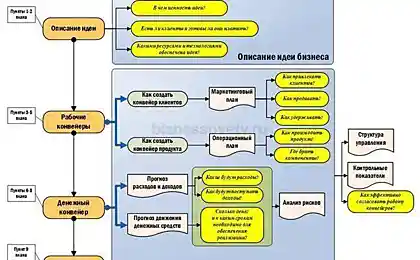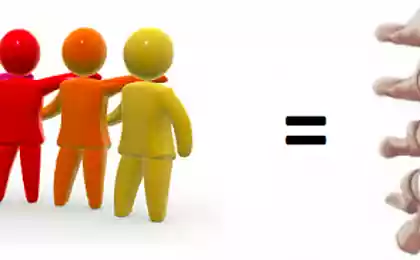404
8 CAUSES of conflict - FIND out!
If you work in an office, or otherwise come into conflict with your colleagues. It happens that in order to become its members, you don't even need to do anything.
Some psychologists believe thatconflicts useful,because the skillful resolution lead to resolving problems and helping people work more effectively.
Psychologists Art bell and Brett HART have analyzed the reasons of work conflicts in the past two years. They came to the conclusion that there are eight and each of them can be quite simple to resolve in that case, if you're aware of their type:

1.Conflict for resources
People have always fought over resources, does not stop this war. A resource can be office supplies, help from colleagues or even a meeting room. When more than one person claims the resource, conflict can occur.
Use the technique of negotiating "win — Win" — in many cases, you can find a way to meet the needs of both parties. Learn the art of persuasion, read this book by Robert Cialdini.
If you have authority in your company or are a leader, make sure that both sides have enough resources. Call them for open discussion, and then follow their arguments and logic of the presentation.
2.The conflict of style
Each person has an individual style of work, which can also lead to conflict. For example, some late, some stay up late or working slow. When different working styles collide — there is a conflict.
Create a friendly atmosphere in the team and never take the point of view of the side which started the feud. If a person is criticized for the fact that he is too slow, but it fulfills all of your requirements, support him publicly and say that you have no claim to it.
Also analyze the style of work of their employees and find a way to use for their abilities.
3.The conflict of perception
Each of us looks at the world through your own glasses and different views can cause misunderstanding. If your colleagues or subordinates regularly come into conflict and the reason for this is not clear, then most likely it is a conflict of perception.
People are also different interpretiruya events. So make sure that you have correctly made your point and understand it all.
4.A conflict of objectives
A simple example: one Manager insists that all employees served customers, and the second believes that service above all, so you can save time on customer service.
When you set goals for your team, make sure they do not overlap and do not conflict with each other.

If you own a slave and you have any ambitious goals that you cannot achieve in his post — talk openly with your boss. Maybe he'll offer you a raise or more serious projects.
5.Conflict pressure
We often rely on your colleagues when you need to finish the job. For example, you requested the report by noon, and already was five o'clock in the evening and its all there. Worst of all, if this person has fulfilled the same request to your colleagues. You will either have to give way, or to put pressure on the person.
Learn to negotiate - because at one point can be made only one request of one person. Either change your schedule to avoid conflict is not a loss, but it is a reasonable strategy.
6.Conflict posts
We also often have to perform work beyond our duties. In this case we step on someone else's territory and people from this area may not like it. You can assign the project, which is usually entrusted to other people, and here you have fertile ground for conflict, resentment, and vengeance.
If you assign a project to one person explain to another why it was done. Your explanation should be enough to appease his anxiety, fears and discontent.
Develop team spirit. All your employees should know that they have one goal and the answer is they, too, will be together.
7.Different personal values
Imagine that your boss asked you to do the job, which contrary to your ethical standards. Will you do what he asked, or refuse? If you refuse, you lose the trust of the boss or even work?
Certainly, ethics are different. If it is in your power, put it in the rules and notify in the interview — people should know what tasks they will perform.
8.Unpredictability rules
Some of the rules themselves conflict with each other, and then all that makes sense is transferred to the people. In addition, the rules often change, and you may forget to inform all your employees about it.
Each rule changes the behavior and even the mindset of the people.
Remember that even a good rule can be interpreted completely wrong and can cause a negative reaction. And despite the fact that there are rules that are unclear as to execute because the user did not think about it.
Again, if you can, watch very carefully for changes in rules and approach to their creation is critical.
Use this knowledge in order to resolve any conflicts in the workplace and create all conditions for successful work. published
P. S. And remember, only by changing their consumption — together we change the world! ©
Source: 4brain.ru/blog/8-%D0%BF%D1%80%D0%B8%D1%87%D0%B8%D0%BD-%D0%BA%D0%BE%D0%BD%D1%84%D0%BB%D0%B8%D0%BA%D1%82%D0%BE%D0%B2/
Some psychologists believe thatconflicts useful,because the skillful resolution lead to resolving problems and helping people work more effectively.
Psychologists Art bell and Brett HART have analyzed the reasons of work conflicts in the past two years. They came to the conclusion that there are eight and each of them can be quite simple to resolve in that case, if you're aware of their type:

1.Conflict for resources
People have always fought over resources, does not stop this war. A resource can be office supplies, help from colleagues or even a meeting room. When more than one person claims the resource, conflict can occur.
Use the technique of negotiating "win — Win" — in many cases, you can find a way to meet the needs of both parties. Learn the art of persuasion, read this book by Robert Cialdini.
If you have authority in your company or are a leader, make sure that both sides have enough resources. Call them for open discussion, and then follow their arguments and logic of the presentation.
2.The conflict of style
Each person has an individual style of work, which can also lead to conflict. For example, some late, some stay up late or working slow. When different working styles collide — there is a conflict.
Create a friendly atmosphere in the team and never take the point of view of the side which started the feud. If a person is criticized for the fact that he is too slow, but it fulfills all of your requirements, support him publicly and say that you have no claim to it.
Also analyze the style of work of their employees and find a way to use for their abilities.
3.The conflict of perception
Each of us looks at the world through your own glasses and different views can cause misunderstanding. If your colleagues or subordinates regularly come into conflict and the reason for this is not clear, then most likely it is a conflict of perception.
People are also different interpretiruya events. So make sure that you have correctly made your point and understand it all.
4.A conflict of objectives
A simple example: one Manager insists that all employees served customers, and the second believes that service above all, so you can save time on customer service.
When you set goals for your team, make sure they do not overlap and do not conflict with each other.

If you own a slave and you have any ambitious goals that you cannot achieve in his post — talk openly with your boss. Maybe he'll offer you a raise or more serious projects.
5.Conflict pressure
We often rely on your colleagues when you need to finish the job. For example, you requested the report by noon, and already was five o'clock in the evening and its all there. Worst of all, if this person has fulfilled the same request to your colleagues. You will either have to give way, or to put pressure on the person.
Learn to negotiate - because at one point can be made only one request of one person. Either change your schedule to avoid conflict is not a loss, but it is a reasonable strategy.
6.Conflict posts
We also often have to perform work beyond our duties. In this case we step on someone else's territory and people from this area may not like it. You can assign the project, which is usually entrusted to other people, and here you have fertile ground for conflict, resentment, and vengeance.
If you assign a project to one person explain to another why it was done. Your explanation should be enough to appease his anxiety, fears and discontent.
Develop team spirit. All your employees should know that they have one goal and the answer is they, too, will be together.
7.Different personal values
Imagine that your boss asked you to do the job, which contrary to your ethical standards. Will you do what he asked, or refuse? If you refuse, you lose the trust of the boss or even work?
Certainly, ethics are different. If it is in your power, put it in the rules and notify in the interview — people should know what tasks they will perform.
8.Unpredictability rules
Some of the rules themselves conflict with each other, and then all that makes sense is transferred to the people. In addition, the rules often change, and you may forget to inform all your employees about it.
Each rule changes the behavior and even the mindset of the people.
Remember that even a good rule can be interpreted completely wrong and can cause a negative reaction. And despite the fact that there are rules that are unclear as to execute because the user did not think about it.
Again, if you can, watch very carefully for changes in rules and approach to their creation is critical.
Use this knowledge in order to resolve any conflicts in the workplace and create all conditions for successful work. published
P. S. And remember, only by changing their consumption — together we change the world! ©
Source: 4brain.ru/blog/8-%D0%BF%D1%80%D0%B8%D1%87%D0%B8%D0%BD-%D0%BA%D0%BE%D0%BD%D1%84%D0%BB%D0%B8%D0%BA%D1%82%D0%BE%D0%B2/























